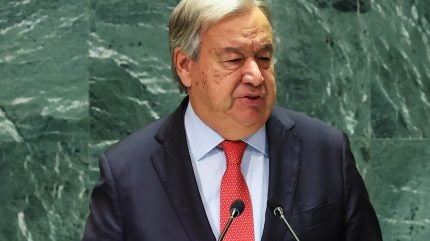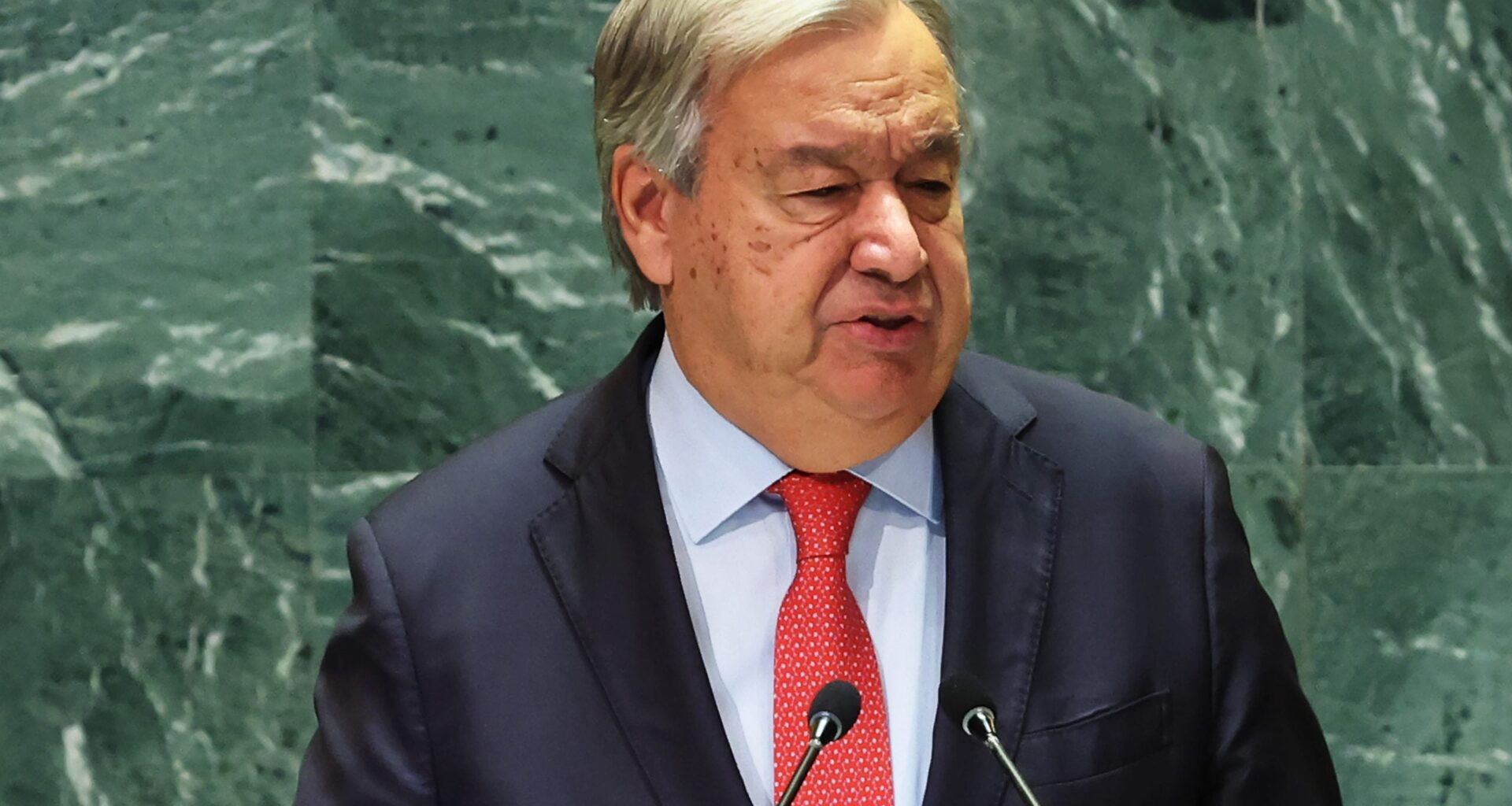
The UN head has called for governments to do more “to protect your people from the ravages of the climate crisis”. Credit: Michael Santiago via Getty Images.
UN secretary-general António Guterres has said “doubling down on fossil fuels is absurd” and “almost everywhere, solar and wind are the cheapest source of new electricity”, as global policymakers, climate experts and lobbyists gather in Baku, Azerbaijan for COP29.
He added that by the next COP meeting, countries “must deliver new economy-wide national climate action plans, and you have agreed that your new plans will align with 1.5 degrees” in an address at the COP29 World Leaders’ Climate Action Summit Opening Ceremony on Tuesday.
“That means they must cover all emissions and the whole economy; advance global goals to triple renewables capacity, double energy efficiency and halt deforestation by 2030; and slash global fossil fuel production and consumption 30% by the same date,” he said.
COP, or the Conference of the Parties, is an annual global summit where countries negotiate climate action strategies and assess their progress.
The conferences have in the past led to large-scale changes. The 21st COP (COP21) led to the 2015 Paris Agreement, which saw nearly 200 countries – including the US and China, the world’s two largest polluters – agree to take action to limit global temperature increases to 1.5°C above pre-industrial levels.
Portuguese politician and diplomat Guterres, who has headed the UN since 2017, said the world is in the “final countdown to limit global temperature rise to 1.5°C, and “time is not on our side”.
Access the most comprehensive Company Profiles
on the market, powered by GlobalData. Save hours of research. Gain competitive edge.

Company Profile – free
sample
Your download email will arrive shortly
We are confident about the
unique
quality of our Company Profiles. However, we want you to make the most
beneficial
decision for your business, so we offer a free sample that you can download by
submitting the below form
By GlobalData
Country *
UK
USA
Afghanistan
Åland Islands
Albania
Algeria
American Samoa
Andorra
Angola
Anguilla
Antarctica
Antigua and Barbuda
Argentina
Armenia
Aruba
Australia
Austria
Azerbaijan
Bahamas
Bahrain
Bangladesh
Barbados
Belarus
Belgium
Belize
Benin
Bermuda
Bhutan
Bolivia
Bonaire, Sint
Eustatius
and
Saba
Bosnia and Herzegovina
Botswana
Bouvet Island
Brazil
British Indian Ocean
Territory
Brunei Darussalam
Bulgaria
Burkina Faso
Burundi
Cambodia
Cameroon
Canada
Cape Verde
Cayman Islands
Central African Republic
Chad
Chile
China
Christmas Island
Cocos Islands
Colombia
Comoros
Congo
Democratic Republic
of
the Congo
Cook Islands
Costa Rica
Côte d”Ivoire
Croatia
Cuba
Curaçao
Cyprus
Czech Republic
Denmark
Djibouti
Dominica
Dominican Republic
Ecuador
Egypt
El Salvador
Equatorial Guinea
Eritrea
Estonia
Ethiopia
Falkland Islands
Faroe Islands
Fiji
Finland
France
French Guiana
French Polynesia
French Southern
Territories
Gabon
Gambia
Georgia
Germany
Ghana
Gibraltar
Greece
Greenland
Grenada
Guadeloupe
Guam
Guatemala
Guernsey
Guinea
Guinea-Bissau
Guyana
Haiti
Heard Island and
McDonald
Islands
Holy See
Honduras
Hong Kong
Hungary
Iceland
India
Indonesia
Iran
Iraq
Ireland
Isle of Man
Israel
Italy
Jamaica
Japan
Jersey
Jordan
Kazakhstan
Kenya
Kiribati
North Korea
South Korea
Kuwait
Kyrgyzstan
Lao
Latvia
Lebanon
Lesotho
Liberia
Libyan Arab Jamahiriya
Liechtenstein
Lithuania
Luxembourg
Macao
Macedonia,
The
Former
Yugoslav Republic of
Madagascar
Malawi
Malaysia
Maldives
Mali
Malta
Marshall Islands
Martinique
Mauritania
Mauritius
Mayotte
Mexico
Micronesia
Moldova
Monaco
Mongolia
Montenegro
Montserrat
Morocco
Mozambique
Myanmar
Namibia
Nauru
Nepal
Netherlands
New Caledonia
New Zealand
Nicaragua
Niger
Nigeria
Niue
Norfolk Island
Northern Mariana Islands
Norway
Oman
Pakistan
Palau
Palestinian Territory
Panama
Papua New Guinea
Paraguay
Peru
Philippines
Pitcairn
Poland
Portugal
Puerto Rico
Qatar
Réunion
Romania
Russian Federation
Rwanda
Saint
Helena,
Ascension and Tristan da Cunha
Saint Kitts and Nevis
Saint Lucia
Saint Pierre and Miquelon
Saint Vincent and
The
Grenadines
Samoa
San Marino
Sao Tome and Principe
Saudi Arabia
Senegal
Serbia
Seychelles
Sierra Leone
Singapore
Slovakia
Slovenia
Solomon Islands
Somalia
South Africa
South
Georgia
and The South
Sandwich Islands
Spain
Sri Lanka
Sudan
Suriname
Svalbard and Jan Mayen
Swaziland
Sweden
Switzerland
Syrian Arab Republic
Taiwan
Tajikistan
Tanzania
Thailand
Timor-Leste
Togo
Tokelau
Tonga
Trinidad and Tobago
Tunisia
Turkey
Turkmenistan
Turks and Caicos Islands
Tuvalu
Uganda
Ukraine
United Arab Emirates
US Minor Outlying Islands
Uruguay
Uzbekistan
Vanuatu
Venezuela
Vietnam
British Virgin Islands
US Virgin Islands
Wallis and Futuna
Western Sahara
Yemen
Zambia
Zimbabwe
Kosovo
Industry *
Academia & Education
Aerospace, Defense &
Security
Agriculture
Asset Management
Automotive
Banking & Payments
Chemicals
Construction
Consumer
Foodservice
Government, trade bodies
and NGOs
Health & Fitness
Hospitals & Healthcare
HR, Staffing &
Recruitment
Insurance
Investment Banking
Legal Services
Management Consulting
Marketing & Advertising
Media & Publishing
Medical Devices
Mining
Oil & Gas
Packaging
Pharmaceuticals
Power & Utilities
Private Equity
Real Estate
Retail
Sport
Technology
Telecom
Transportation &
Logistics
Travel, Tourism &
Hospitality
Venture Capital
Tick here to opt out of curated industry news, reports, and event updates from Offshore Technology.
Submit and
download
Visit our Privacy Policy for more information about our services, how we may use, process and share your personal data, including information of your rights in respect of your personal data and how you can unsubscribe from future marketing communications. Our services are intended for corporate subscribers and you warrant that the email address submitted is your corporate email address.
He urged attendees to focus on three priorities.
“First, emergency emissions reductions. To limit global temperature rise to 1.5°C, we must cut global emissions 9% every year,” he added.
At this COP, attendees must agree to fair rules, with “effective carbon markets that support that fight”. Guterres also called for markets that “respect the rights of local communities, and leave no space for greenwashing or land-grabbing”.
Second, he called for governments to do more “to protect your people from the ravages of the climate crisis” and said that the “most vulnerable are being abandoned to climate extremes”.
“The gap between adaptation needs and finance could reach up to $359bn a year by 2030. These missing dollars are not abstractions on a balance sheet: they are lives taken, harvests lost and development denied,” he said.
Last, finance needs to become a “priority”, with developing countries eager to act “facing many obstacles: scant public finance; raging cost of capital; crushing climate disasters; and debt servicing that soaks up funds.”
“Last year, developing and emerging markets outside China received just $0.15 for every dollar invested in clean energy globally,” he said, and COP29 must “tear down the walls to climate finance” and “developing countries must not leave Baku empty-handed. A deal is a must.”
This year’s conference will focus primarily on climate finance. It will aim for something called a ‘new collective quantified goal’ (NCQG) for climate financing. This goal will replace a previous target of $100bn annually by 2020, which developed nations failed to meet on time.
The NCQG is seen as essential for mobilising funding for developing countries to help them address climate change.
One report from the Grantham Institute of the London School of Economics has estimated that developing countries outside China will need approximately $1trn of investment annually by 2030 to transition to low-emission, climate-resilient economies.
Guterres also outlined five elements that are “critical to success”.
These are a significant increase in concessional public finance; a clear indication of how public finance will mobilise the trillions of dollars developing countries need; tapping innovative sources, particularly levies on shipping, aviation and fossil fuel extraction; the development of a framework for greater accessibility, transparency and accountability; and boosting lending capacity for bigger and bolder multilateral development banks.
